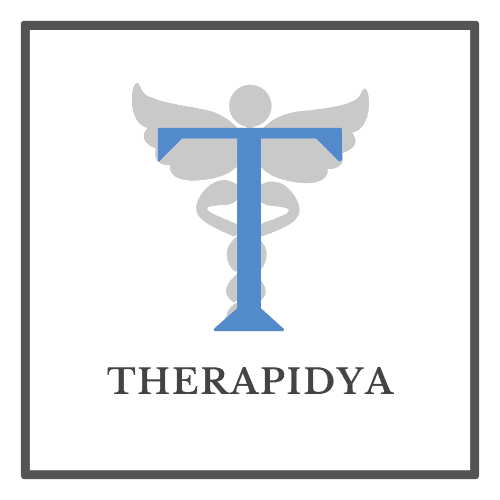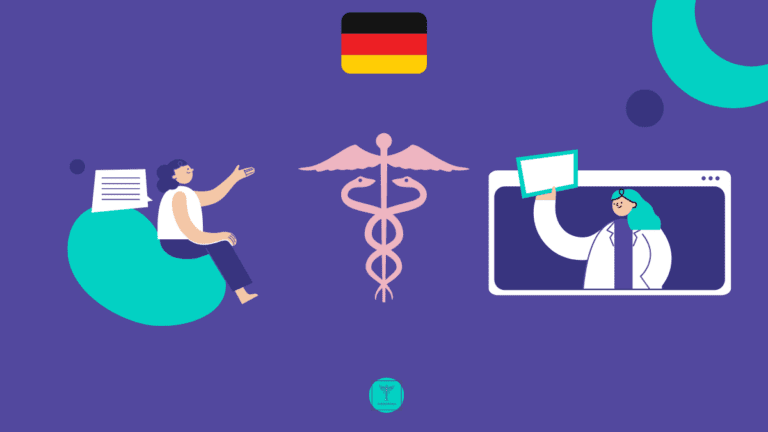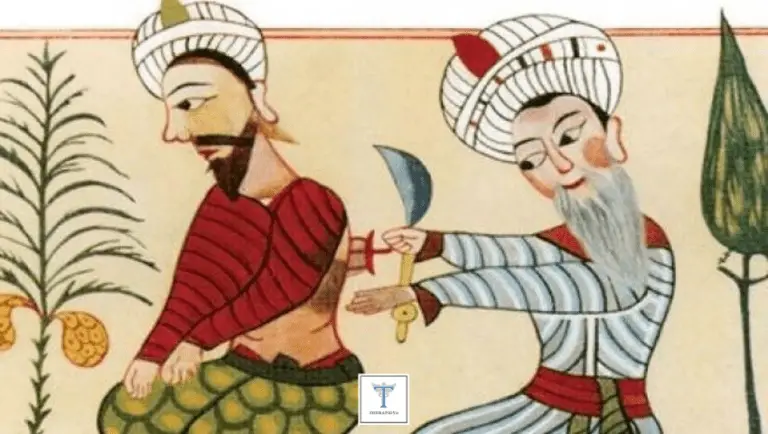Chronic Diseases During Hajj: A Full Guide .. 2023
All of this will exhaust the pilgrims and put additional strain on chronic diseases during Hajj like the heart, chest, kidneys, diabetes, and high blood pressure.
The Hajj season is distinguished by the presence of millions of Muslims in one location, where the pilgrim is subjected to a variety of hardships during the rites of Hajj, including difficulties in travel and access to the Kingdom, walking to perform religious rites, and weather fluctuations that the pilgrims are expected to face.
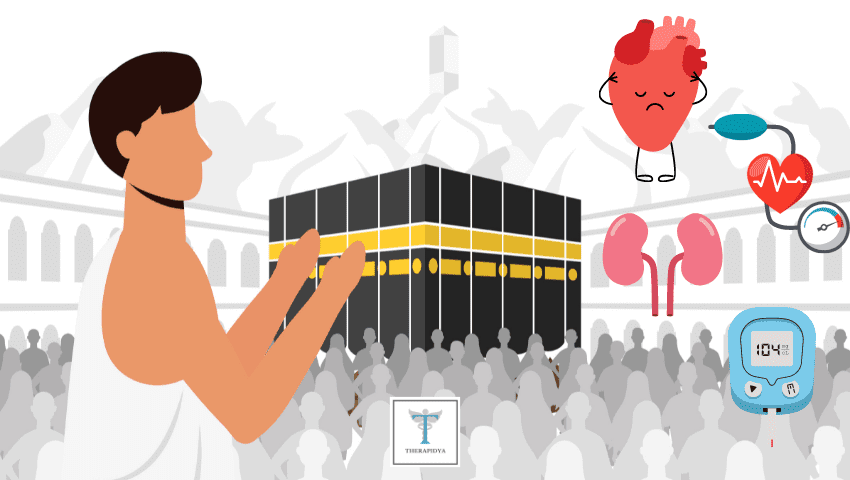
The People Who Should Not Perform Hajj
In this regard, cardiologists and arterial catheters indicated that there is a specific group of people who are not advised to perform the Hajj, as God Almighty stated:
- Who is affected by third and fourth stage heart pain?
- Anyone who experiences chest pain while walking for less than ten metres.
- Who has high blood pressure and is unable to control it.
- Anyone suffering from shortness of breath in the third and fourth stages.
- Who has heart failure that is accompanied by leg swelling?
- People who have had a heart attack or a stenting procedure within the last month.
- Who has severe narrowing of the heart valves?
- Also read: Licorice Oil: 4 Incredible Benefits, Warnings, Side Effects and Interactions
Chronic Diseases During Hajj: Hearth Disease
Heart patients are one of the groups most vulnerable to health problems as a result of the physical effort required during Hajj rituals, and we offer them some tips to help them perform Hajj without jeopardizing their health.
Having heart disease necessitates a certain way of life in order to avoid serious complications, so it is critical to ensure that the patient is able to perform Hajj rituals and follow a number of tips and instructions to ensure his safety.
The following are some precautions that pilgrims with heart disease should take to ensure their safety:
- Avoid congested areas and peak times as much as possible.
- Eat fewer heavy, fatty, and salty meals.
- Drink plenty of fluids.
- To avoid a drop in blood pressure, avoid taking diuretics and fluids containing caffeine.
- Make sure you get enough sleep and avoid staying up late and stressing yourself.
- The presence of an identification card containing information about the patient’s medications and diseases.
- Ensure that all necessary vaccinations, the most important of which are meningitis and seasonal influenza, are received.
- The importance of maintaining personal hygiene.
- Nasal masks should be worn.
- Take medications on time and on a regular basis; this is one of the most important tips for pilgrims with heart diseases.
- As soon as you notice symptoms such as shortness of breath, chest pain, or palpitations, go to the nearest health center.
Heart patients must make the pilgrimage after consulting and agreeing with a doctor who is aware of the patient’s health condition, as well as following the advice of previous pilgrims suffering from heart diseases
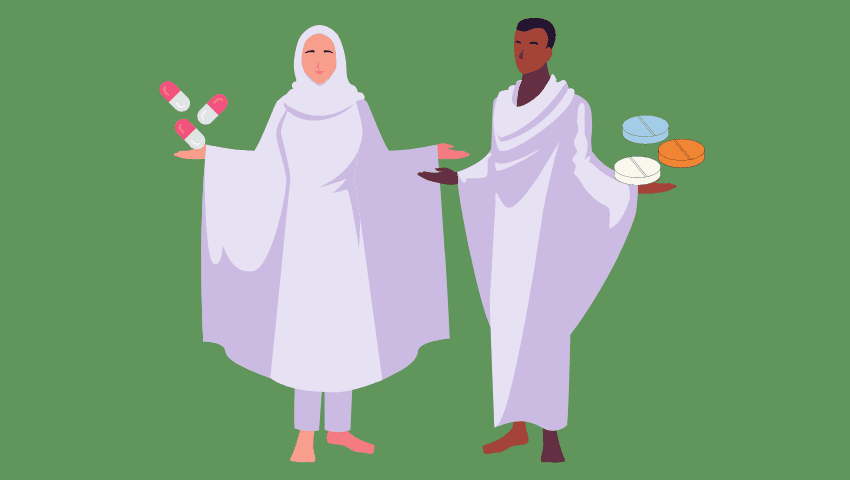
Chronic Diseases During Hajj: Diabetes
Maximum measures should be taken to control diabetes, with the help of a doctor, at least two months before the date of travel, to ensure that the method of control is good and that the appropriate medication is taken.
Diabetics should also pay special attention to their feet, including treating minor scratches and cuts until they heal.
In the case of diabetes, the complications of injuries may be exacerbated, resulting in excessive pain, distress, and the possibility of missing out on Hajj rituals.
It is critical to follow a diabetes-friendly diet and to follow the following guidelines:
- Place the insulin in a small ice container or the refrigerator at your lodging to keep it cool during transportation.
- Take the glucagon injection (on the doctor’s advice) to be injected by family members or companions on Hajj if you are unable to eat or lose consciousness.
- Wearing reinforced and easily stretchable fabric stockings during Hajj to protect the feet from blisters, as well as not walking barefoot.
- To avoid cuts and infections, use an electric razor instead of a razor.
- Eating enough food and getting treatment before beginning the tawaf or saa’i to avoid a drop in blood sugar levels.
- Drinking water in appropriate quantities and on a regular basis is one of the most important tips for those suffering from chronic diseases during Hajj.
- If you experience symptoms of low blood sugar, such as dizziness or tremors accompanied by fatigue and exhaustion, as well as sudden hunger, profuse sweating, and blurred vision, temporarily stop performing the rituals.
- To avoid being exposed to a severe drop in sugar levels, make sure to eat the main varied meals and entertainment during travel and pilgrimage.
- When skin infections occur, bring sterile materials to treat them.
- Make sure you have a glucose meter to measure your blood sugar level on a daily and regular basis, especially if you have a sugar imbalance.
- In the event of complications, ulcers, or skin infections, seek medical attention immediately.
Chronic diseases during Hajj: High Blood Pressure
The following is a set of health guidelines related to Hajj when suffering from high blood pressure:
- Visit your doctor periodically several weeks before, because if it is necessary to change the medication, it can be long enough to balance your blood pressure before travelling well in advance.
- Changing the dose of medications if you are being treated with diuretics due to the heat, and thus follow your blood pressure changes and seek advice in case of doubt.
- Consult the doctor in carrying Nitroglycerin tablets if you are likely to suffer from angina pain, which are taken under the tongue, and take these tablets with you wherever you go.
- Not to be exposed to any excessive physical exertion and to use a wheelchair during tawaf and saa’i when feeling stressed, as one of the tips when suffering from these chronic diseases during Hajj.
- Not being exposed to excessive emotions and nervousness, and remembering tolerance is a characteristic of the pilgrim.
- Refer to the nearest health center or hospital to take the necessary medical care in case you have severe chest pain.
Chronic diseases during Hajj: Kidney Disease
To complement the discussion of chronic diseases during Hajj, we present here health guidelines for kidney patients, such as: patients with kidney failure , patients with poor kidney function, and patients with kidney stones:
- Consult a specialist doctor to ensure that you can perform the Hajj and receive the necessary medical instructions.
- Make a note of and carry the prescribed medications for each disease, and keep them in a convenient location.
- Make a commitment to taking medications on time.
- Make sure to consume fluids and salts on a regular and adequate basis, as prescribed by your doctor.
- In the event of any bodily disorders, such as urinary tract infections or gastroenteritis, contact the mission doctor or the nearest hospital or medical service center.
- Avoid exposing yourself to the scorching heat of the sun for extended periods of time to avoid losing fluids and salts from the body.
- When planning a diet, consult a nutritionist ahead of time. It is preferable to avoid eating a lot of meat in order to keep the kidneys functioning properly.
This post is also available in: Dansk (Danish) Nederlands (Dutch) Français (French) Deutsch (German) עברית (Hebrew) Italiano (Italian) Polski (Polish) Română (Romanian) Русский (Russian) Türkçe (Turkish) Español (Spanish) Български (Bulgarian)
